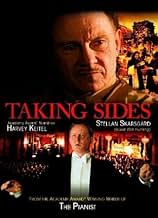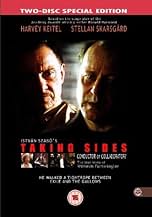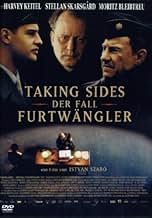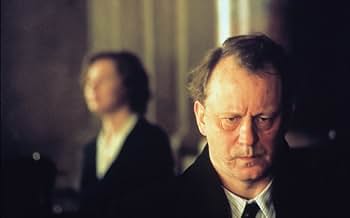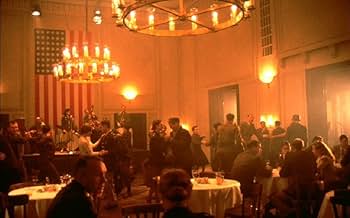Adicionar um enredo no seu idiomaAfter the end of World War II, a famous German conductor is accused of loyalty to the Nazi regime. He argues that art and politics are separate. An investigator thinks otherwise.After the end of World War II, a famous German conductor is accused of loyalty to the Nazi regime. He argues that art and politics are separate. An investigator thinks otherwise.After the end of World War II, a famous German conductor is accused of loyalty to the Nazi regime. He argues that art and politics are separate. An investigator thinks otherwise.
- Prêmios
- 9 vitórias e 3 indicações no total
Avaliações em destaque
The Major pursues Furtwangler like a rabid dog, determined to show that that Furtwangler was guilty of something.Why didn't Furtwangler leave when he had the chance? Did he seek out accolades from the devil?
Why is Major Arnold so Angry? It it the anger of a small man who feels spat upon by life, suddenly given the chance of bring down someone once so High and Mighty?
FurtWangler is aloof, distant, full of easy platitudes about the redemptive quality of Art. Major Arnold is mean and streetwise, quick to attack and condemn those who he does not understand.
Who is in the wrong? In the end does it mean anything to believe you are right? In whose eyes anyway? This film asks some difficult questions about how we perceive ourselves and others, how we question our most basic motives. Very Good.
This is actually one of the central themes of the work of director Istvan Szabo. In 'Mephisto' and 'Hanusses' he was also dealing with the Nazi era, but by telling WWII stories the Hungarian director does nevertheless talk also about all dictatorships, or specifically the Communist rule he knew directly.
The action of the film happens after the war, when Wilhelm Furtwängler, one of the greatest directors of the century stands on trial in a denazification tribunal for his cooperation with the Nazi regime. Despite many of the great musicians of the era he did not live Germany, he played for the Nazi dignitaries in Jews-free orchestras, and his opposition to the Nazi regime is unclear. He was not a Nazi party member, and he intervened to save lives of Jewish musicians, but yet was used a propaganda tool until the very end of the war.
The balance of the movie lies in the balance of the superb acts of the two principal actors. Harvey Keitel plays the American prosecutor major Arnold, while Wilhelm Furtwängler is played by the Sweidish Stellan Skarsgård. Arnold is the opposite of Furtwängler in almost any plane. To his moral superiority enhanced (maybe not necessarily) by filmed reports from the death camps is opposed Furtwängler's ambiguity and doubts, but his rudimentary culture is no match for the European refinement of the director. Keitel gives a strong act, maybe a too strong one, as his rudeness opposed to the doubts and maybe remorse of the German seem to give to the musician a postume and probably not deserved absolution.
The last scene shows Furtwängler living the building where the interrogation happened in the sounds of Beethoven's Fifth. The director switches to a real filmed concert with the same music, at the end of which Furtwängler shares hands with a Nazi dignitary (may have been Goebels, the Nazi minister of propaganda). The he is shown (twice, once in close plan) wiping his hand as in some kind of cleaning act. The question remains if a handkerchief is enough to clean somebody who shook hands with the Devil.
But, as another person here has said, one of the great things about this movie is that it will start arguments.
The film is the story of the investigation by the American post-war authorities to decide whether the accusations of collaboration are valid. The film presents two ethical answers. The first one is stated by the American officer (played excellently by Harvey Keitel), who believes that Furtwängler is morally guilty, as he accepted a shining career from the Nazi's hand. The second answer is presented by Furtwängler himself who tries to defend himself by stating that in order to help (by "help" he both meant practical assistance - as he did save many Jews during the war - and a spiritual message - as he claimed that his music maintained the inner good in his nation's soul even in the time of Evil) he had to compromise with the Nazis, but he never really collaborated with them. The film itself (despite its title) does not take side, although it seems to sympathize with Furtwängler as an artist and generally presents the American officer as an ignorant and illiterate person. However, as the investigation proceeds, this aggressive and obnoxious person asks questions that are very hard to answer: is it acceptable to make such a compromise with a regime that kills 6 million Jews? Is it really so that Furtwängler made the compromise with the idea of helping people in need? Or rather, did he make it to advance his career?
The film has triggered exciting conversations with my friends who have differing opinions. I think these lengthy talks are the best proof that this is an excellent film and it has achieved its aim.
The story has several layers (I particularly liked the way differences of American and German cultures are presented), the characters are exciting and well played: if you like thought-provoking movies, go for this one!
Você sabia?
- CuriosidadesTo the criticism of both movie critics and American audiences of depicting the American Denazification officer Maj. Steve Arnolds (Harvey Keitel) as a "caricature, a bully, a Philistine," screenplay writer Ronald Harwood told The Jewish Journal that he went on to comb archives for denazification transcripts and to interview officials who had supervised such proceedings."They were morally brutal," Hardwood stated. "They bullied people, and they did behave in an extreme way. But they had just seen the camps, and no one in the world had seen that before."
- Erros de gravaçãoWhen Major Arnold is listening to the recording of Beethoven's Fifth Symphony, the record finishes the first movement and carries straight on to the second. Long playing albums, which ran at 33 1/3 rpm, were introduced in 1948, but the record shown is a 78 rpm one. The performance of the 5th Symphony would have been on a set of five 78 rpm records, one movement each, split over the two sides. It should not be possible for the second movement to start without the record being changed.
- Citações
Emmi Straube: When he made his decision, he couldn't have known everything. Especially not the way people like you do, who've returned from exile and feel that you have a right to pass judgement. Because you are blameless, you think you know best who is a sinner and who deserves forgiveness. But you have no idea how people lived here.
- ConexõesEdited into Taking Sides Again (2004)
Principais escolhas
- How long is Taking Sides?Fornecido pela Alexa
Detalhes
- Data de lançamento
- Países de origem
- Idiomas
- Também conhecido como
- Думки сторін
- Locações de filme
- Empresas de produção
- Consulte mais créditos da empresa na IMDbPro
Bilheteria
- Orçamento
- US$ 20.000.000 (estimativa)
- Faturamento bruto nos EUA e Canadá
- US$ 188.952
- Fim de semana de estreia nos EUA e Canadá
- US$ 22.051
- 7 de set. de 2003
- Faturamento bruto mundial
- US$ 422.832
- Tempo de duração1 hora 48 minutos
- Cor
- Mixagem de som
- Proporção
- 1.85 : 1
Contribua para esta página


